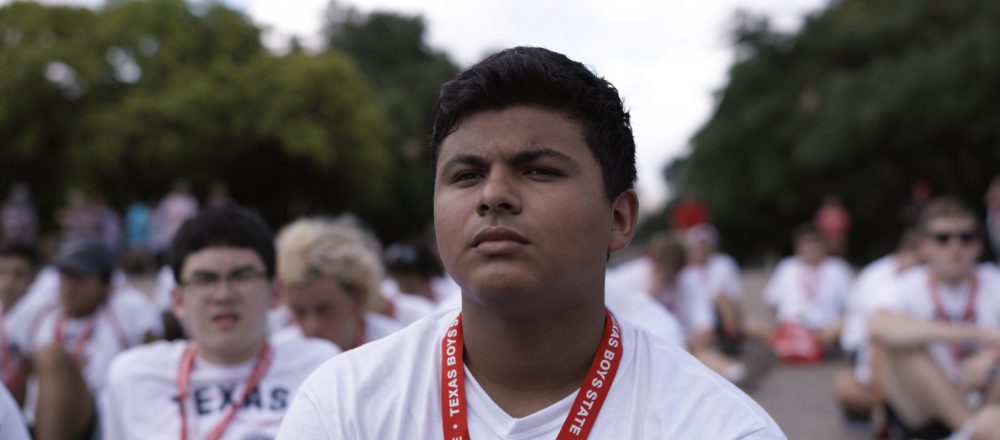* This review contains spoilers
In 2017, filmmakers Jesse Moss and Amanda McBaine came across an article about a successful motion for the state of Texas to secede from the Union. The motion was passed not by the Texas legislature but rather a group of about a thousand teenage boys participating in a political simulation. Their curiosity piqued, Moss and McBaine closely followed the participants of the following year’s Texas program which is the subject of their 2020 documentary Boys State.
Boys State is an annual civic leadership program run since 1935 by the American Legion (a non-profit organisation of veterans) to give teenage boys a taste of the political process. 1100 teenage boys gather in Texas and are tasked with forming a state government from the ground up. Participants are divided into two parties – Nationalists and Federalists – however this division is not meant to replicate the Democratic and Republican parties.
Rather, the boys are encouraged to debate the issues that matter to them and create their own unique platform. Both parties then engage in a mock electoral process in order to fill a range of positions, the highest of which is governor. The program’s most well known alumni include politicians Bill Clinton, Dick Cheney, Cory Booker and Supreme Court Judge Samuel Alito
The film closely follows four participants who are at the centre of the gubernatorial campaign. Two of them – Ben Feinstein and Robert MacDougall – fall on the conservative spectrum, while the other two – René Otero and Steven Garza – are among the few progressives in the largely right-leaning cohort.
Ben Feinstein is the shrewd and canny political nerd. A believer in American Exceptionalism, he is shown with his Ronald Reagan action figure. Ben is also an amputee and had wanted to serve in the military as a child, but now aims to work for the FBI. Robert MacDougall, with his floppy hair and conventional good looks is set up as the archetypal young, white, conservative male. Cocky yet charismatic, he is first shown in a comfortable suburban home, toying with a rifle. We learn that over the summer he interned for the Republican party and hopes to get into West Point Military Academy.
Steven Garza is the soft-spoken and unassuming Latino from a working class family. (His mother was formerly an undocumented immigrant, he tells us.) Garza is the first in his family to graduate from high school and bears the weight of wanting to make his parents proud. We first see him in a Beto for Senate t-shirt as he talks about being inspired into politics by Bernie Sanders. An optimist with high-minded ideals, Steven is often shown at a distance from the raucousness that defines the Boys State environment.
Perhaps the star of the film is René Otero. An affable and whip-smart Black teen with formidable debate skills, René is initially sceptical of the program. However, he soon realises the value of understanding the conservative psyche to inform his own progressive politics. “This is literally what every liberal needs,” he concludes.
Success in being elected depends on the level to which one is able to elicit a strong reaction from other party members. This is usually done by whipping up the crowd into a frenzy through an appeal to hot-button issues and extreme nationalism. As one would expect with a gathering of a thousand adolescent men, the atmosphere becomes one of grunting, hooting machismo and bravado. “Our masculinity will not be infringed!” booms one candidate during his speech for election. Tellingly, the participant who eventually wins the title of governor is described by his peers as a young Ben Shapiro.
What makes Boys State so fascinating is watching Gen-Z’s dexterity in fusing an electoral process with social media. Both parties’ campaigns are on Instagram and Snapchat and are fuelled by memes, gifs and quirky videos – which quickly slides into racism with unflattering allusions made to René’s race. The campaign is an interesting insight into the way that young people have democratised political discourse and activism through the social media and popular culture – a phenomenon that is evident everyday on the internet, in everything from eyelash tutorials about Uyghurs to TikTok pranks on Trump’s campaign rallies.
Despite being given the chance to start a government from the ground up, the boys ultimately revert to the most contentious issues in American politics: guns and abortion. This may be the result of Texas’ conservative demographics but could equally be the result of the media saturation of American political discourse. Progressives like René and Steven have little opportunity to debate these entrenched views as going against a (perceived) majority is a sure way of losing their influence among their peers. In fact, Steven’s prior activism with the March for Our Lives movement comes to haunt him during his run for governor.
Theodore Roosevelt noted that “a typical vice of American politics is the avoidance of saying anything real on real issues.” This is certainly what we observe in the film, where the participants rely heavily on buzzwords and political theatre in order to advance rather than substantively debating policy. In the few instances where participants pass bills and debate legislation in the Texas House of Representatives, they fall into silly motions like banning pineapple on pizza, alien invasions and changing the pronunciation of ‘w’ to ‘dubya’.
However, the most concerning aspect of the film is the all-male environment in which the boys develop their political formation; the American Legion runs a separate program for girls called Girls State. Steven is the only participant who expresses any discomfort in the all male environment: “Boys State is a little too genderfied [sic]. We should go for People State,” he tells a bewildered peer.
It’s no surprise that the absence of women as both participants and mentors (or even constituents) defines the way in which the boys approach issues such as abortion. The most chilling moment, for this female reviewer, was watching a room full of six hundred teenage boys whooping in approval of a candidate’s anti-abortion stance. What message does it send to young men during this formative process, if they do not see women and women’s concerns as part of the political process?
We later learn that Robert, in spite of his outwardly pro-life stance is in fact pro-choice. “Sometimes you gotta say what you gotta say to win,” he admits. This revelation speaks volumes about the way that the gun and abortion debates function within right-wing political discourse – as appeals to a conservative identity rather than meaningful political positions.
After the release of the film, Otero penned an opinion piece in The New York Times on how his experience at Boys State had convinced him to stay away from politics. Otero wrote about the easy slide into complacency that overtakes those looking to gain influence and the way that individuals are subsumed into the machine of politics through compromise and self-censorship. This process he argued “is not intended to accommodate those of us who are Black, or brown, or queer. To effectively represent my identities and communities is to be labelled “radical” and unelectable.”
Watching Boys State was at times a mirror of the demagoguery and bullishness of the Trump presidency. With little time left until the 2020 US election, it is unnerving to witness the same pernicious elements being replicated in the next generation. Nevertheless, there were heartfelt moments where the rhetoric and bluster were stripped back and the boys expressed their vulnerability and solidarity with each other. This is a raucous, boisterous yet tender film that offers a complex portrait of budding masculinity at a time when our society is grappling with what it means to be a man.





